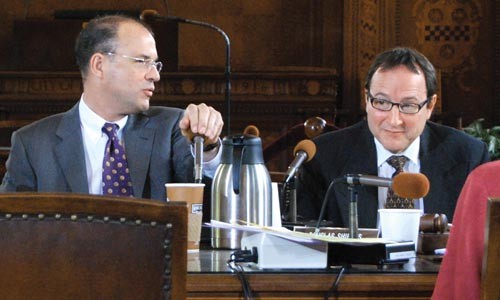For Loni McCartney -- and for many other Pittsburgh residents in unmarried relationships -- a bill introduced in city council on June 3 has been a long time coming.
Cosponsored by Councilor Bruce Kraus and Council President Doug Shields, the legislation would establish a "Mutual Commitment Registry." While sponsors stress that the bill's primary purpose is to do some legislative "housecleaning" on benefits the city already offers, the bill may be the closest thing same-sex couples are likely to get to a marriage license.
"Pittsburgh has always been known to be a decade behind the country," says McCartney. "But right now it is progressing so quickly."
The legislation, which was to be introduced as this issue goes to press, notes that Pittsburgh "is made up of a diversity of households" that include "committed, unmarried couples in either same or opposite sex relationships." And in order to provide "efficient and streamlined disposition of health care ... or other benefits that the City or businesses within the City might offer," the legislation would allow "any two adults in a committed relationship ... to obtain a certificate attesting to their status."
While the certificate would not be legally binding as a marriage license is, it could be used by private employers to determine which employees qualify for domestic-partner benefits. And, McCartney says, the bill could establish an important precedent for providing marriage licenses to same-sex couples in the future: "We're saying it's OK for people of the same sex to be a couple," she says.
The key provisions:
-- To have their relationship listed, the couple must live within the city and fill out a "Mutual Commitment Affidavit." The statement pledges that they've been in "a committed relationship" for at least a year, and "intend to remain together indefinitely." They must also be at least 18 years old, not married or in another domestic-partner relationship, and "not related by blood closer than permitted for married couples."
-- Along with a $25 fee, partners must provide three forms of documentation demonstrating that their relationship is binding. Evidence can include: joint mortgages or utility bills; proof that one partner has named the other as a beneficiary on a life-insurance policy or a will; or a "power of attorney" allowing partners to make medical decisions for each other.
-- The couple must agree to file a "Termination of Mutual Commitment" if either partner dies or their relationship ends. If a partnership terminates, the proposed legislation prevents either partner from registering for another one for a year.
In one sense, the Shields/Kraus bill is modest: City government has offered domestic-partnership benefits to gay and straight employees since the 1990s, and those relationships would be "grandfathered in" without registering. Domestic partnerships have "already been on the books for so many years," Kraus says. "This is just a way to formalize that process, which we haven't done to date."
Some of the legislation's effects remain uncertain. One provision, for example, grants hospital-visitation rights to registered partners; Kraus acknowledges the city "probably doesn't" have the power to compel hospitals to comply, but says he hopes the legislation will open discussion with health providers.
But Philadelphia and other cities have such registries already, and in a statement prepared with the legislation, Shields said, "This legislation will help us keep pace with the rest of the country in our efforts to attract both employers and employees."
McCartney first brought the idea up with Shields last winter, when she "bought" him in a charity auction for $350. "My partner and I went to his house for dinner," she says. "It was wonderful. I brought [the registry] up and he said, ‘Let's talk about it.'" The measure is being brought forward now in hopes that it will be signed into law in time for the city's Pride Week celebration later this month.
"It's a very tiny step down a long road," says McCartney.
In the short term, the measure could be a boon for Pittsburgh corporations that already recognize domestic-partner benefits -- and could encourage others to begin doing the same.
PNC Financial, for example, offers health insurance and other domestic-partner benefits similar to those enjoyed by married couples. "It was a business decision: It helps as a recruiting tool," says spokesperson Fred Solomon. "And it's also the right thing to do." But the company doesn't have hard-and-fast rules for verifying partner status.
"PNC asks that employees who make use of these benefits be registered in some municipality," says Solomon. But no local municipalities register such couples, and Solomon says, "We reserve the right to see the registration in the same way we reserve the right to see a marriage certificate -- we typically don't ask."
Bank of New York Mellon, meanwhile, has a different standard of documentation for its employees. Those seeking the benefits must fill out a "Declaration of Domestic Partner Status," and "you also have to show evidence of a spouse-like relationship," says spokesperson Ron Gruendl. Like the city's proposed registry, the company accepts various forms of proof: joint bank accounts or credit-card statements, evidence of a shared residence, etc. The benefits are offered to hetero or same-sex couples alike, Gruendl says, and provide "everything you would offer a conventional married couple."
Even so, Pittsburgh's measure may seem modest when compared to, say, the California Supreme Court's recent ruling overturning a statewide ban on gay marriage. In light of such sweeping change, those seeking full legal recognition of same-sex couples may see a registry as nothing more than feel-good legislation. It doesn't mandate that such unions be recognized, and it doesn't have any effect at all outside the city. Kraus himself notes that the city "recognizes these partnerships already, so this is just a way to formalize that process." While some conservatives may try to "spin this as a step toward gay marriage," he says, "we as a city certainly have no power in that regard."
But McCartney sees it as an important step forward, both for the city and for unmarried couples within it. "It shows that government is supporting its citizens, no matter what their orientation." In fact, while McCartney is a board member of the Delta Foundation -- the LGBT advocacy group that is coordinating this month's Pride Week activities -- she and other backers have said very little about the measure even to other members of the LGBT community: Based on the conservative backlash against same-sex couples, McCartney says she expects a "media frenzy" when the bill is made public.
In municipalities that already have registries, officials say they have evolved into very practical tools -- tools that can make it easier for employers to offer benefits to workers, regardless of state law.
At least 72 cities and counties across United States -- ranging from Philadelphia to Lawrence, Kan. -- provide domestic-partner registries. Most offer terms similar to Pittsburgh's proposed legislation.
Cook County, Illinois -- which includes Chicago -- is preparing an October celebration to commemorate five years of its registry. The registry there is open only to same-sex couples, but more than 1,300 couples have taken advantage of it.
"You can argue that our legislation didn't have a great deal of teeth," says Cook County Clerk David Orr. But, "We knew custom and tradition would build this thing." Local employers, Orr said, found it easier to offer domestic-partnership benefits once there was a standard means of verifying the relationship: Among employers, Orr said: "The particular moral concern was not of interest, but how to make their businesses run. ... The symbolism turned into reality."
Eureka Springs, Ark., enacted its registry last June, and couples from all over the nation -- 186 so far -- have signed up. While the registry is just a year old, local ministers have twice sought a voter referendum to repeal it. But the effort to reach the ballot failed both times, because city clerk Mary Jean Sell ruled their petition was defective. "You could see the foot-stompin' in their head," says Sell, whose office also handles the registry applications. "They were real upset about it."
But Sell is unapologetic: Eureka Springs is a mecca for gay tourists, and Sell says that at least a quarter of the full-time population is gay as well. Having the registry "means a lot to a lot of people. We're real proud of it."
In Pittsburgh, McCartney says she expects resistance from both sides of the spectrum: from conservatives who think any step toward recognizing same-sex relationships is a step too far -- and also from those who say it doesn't go far enough. "I'm expecting somebody to say this is a halfway measure," she says. "But something new this year means something new next year."
And McCartney can guarantee that the registry will have an immediate impact in helping the city retain at least two residents: She and her partner currently live in Carrick, but are looking for new digs. If the city had a registry while suburban communities did not, "I would stay in the city," McCartney says.
In fact, if the bill passes, McCartney says, "I want to be the first in line to register."















